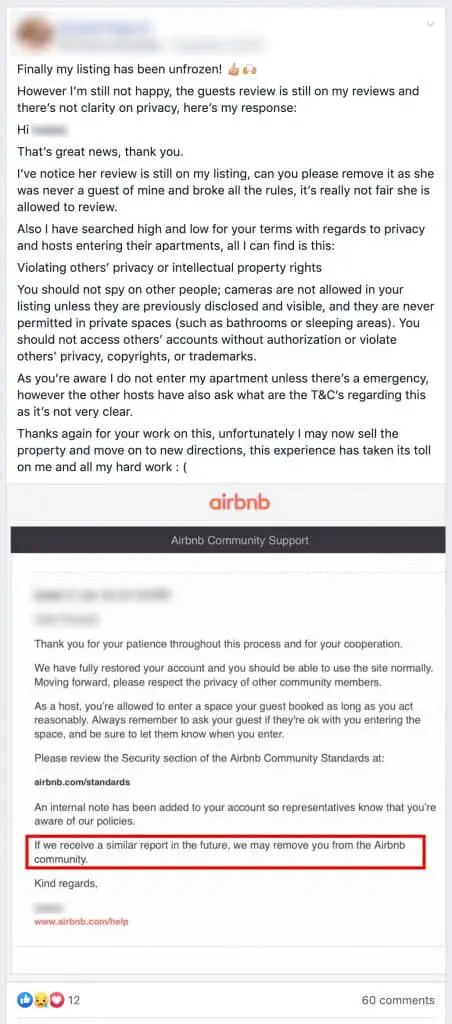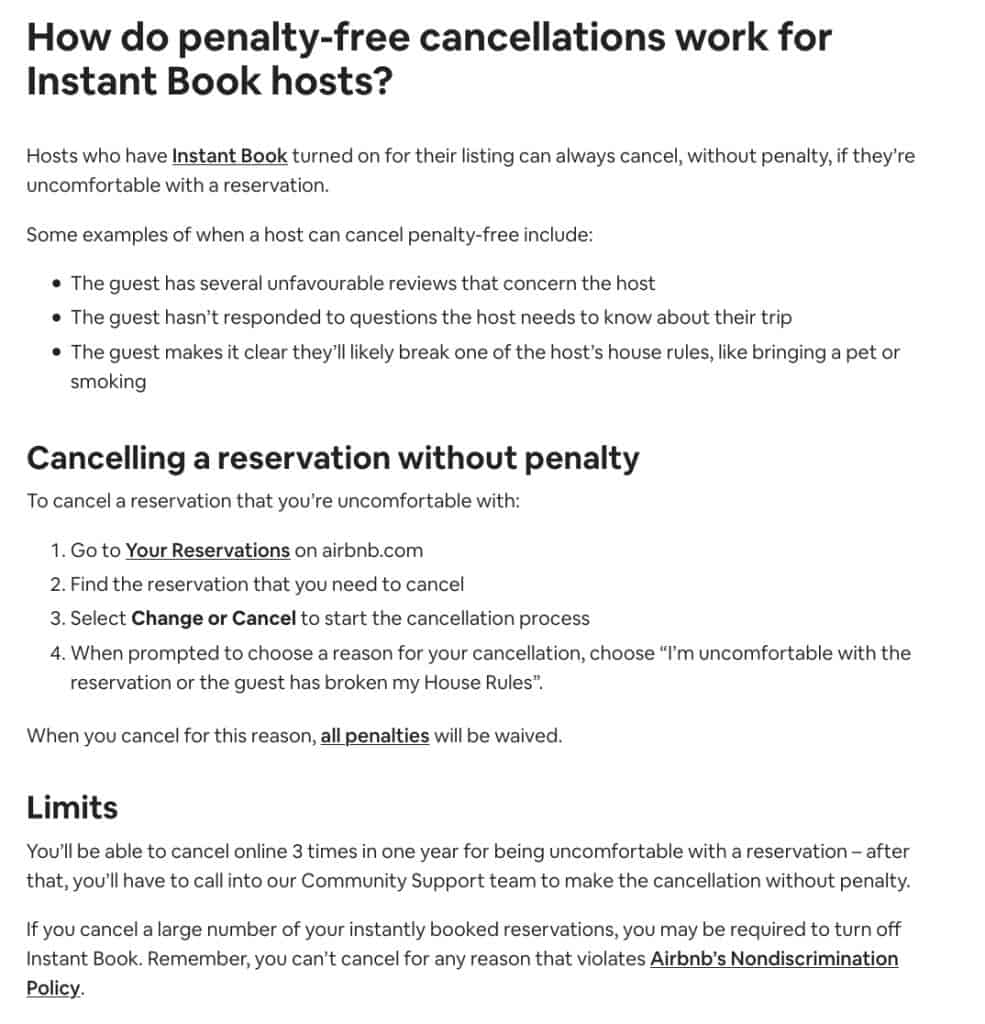Airbnb and Booking.com are two of the giants of the online travel booking world – especially when it comes to letting private accommodation. But which actually delivers a better and easier service for hosts?
I’ve used both platforms for over 4 years, so this article is my take on which platform is better, and breaks down the pros and cons of each.
Of course, which platform you use depends on what you’re hosting. For the sake of clarity, I am writing this article with specific reference to just two of the apartments I host in an area of Kent, in the South East of England.
1. Booking Rates and Traffic
Without a doubt, one of the most important things that an online travel agency (OTA) will deliver you is bookings. No bookings, no cigar, so this is why I’ve focussed on this section first.
In my experience, booking.com delivers far, far more bookings than Airbnb. At least 20 times more. Whenever my calendar pops up with a new booking, the vast majority of the time it will be from booking.com, and this is with the Airbnb instant booking feature turned on. So the question is why?
Before I come to this, for the sake of clarity, our photos are identical on both sites, the reviews are more or less identical, and for most of the last 4 years, I’ve been a super-host on Airbnb.
Why do I get more bookings on booking.com?
There are a number of reasons for this (in my opinion). Firstly, I think it’s necessary to look at the two companies, who they are, and what their goals are.
Airbnb.
Airbnb is a disruptor. It has aimed to change the world of travel completely. It was the first major company to promote the sharing economy in hospitality, and it has a culture that is very much focused on being both a “good” host and a “good” guest.
It is also extremely well known and relatively easy for anyone to access and host. Put simply, in my view, Airbnb aspires to be more than just a travel website, it seeks to build a travel and (hospitality?) community. You can see the official mission statement below:

Booking.com
Booking.com is decidedly different from Airbnb. Their aim, as I see it is to secure as many bookings as possible for their properties. And they’re good at this. They make use of retargeted advertising (have you ever noticed if you clicked on a property on booking.com you might then see it pop up on another website with ads on – this is called retargeting), email marketing, and generally pretty aggressive sales strategies.
Why do I get more bookings on booking.com
- Booking.com (I believe) is basically on the side of the property. They want to promote you as much as possible, and they have an excellent toolbox of resources, and promotions to help you achieve this.
- Well over 75% of properties where you rent the whole property on Airbnb are not on booking.com. Booking.com is slightly harder to register with and therefore many people are put off registering with them. With Airbnb, there is also something of an “Airbnb cult” culture, where people stick to the platform as if it’s the holy grail rather than broadening their horizons and looking elsewhere.
- Booking.com has a set of cancellation policies that are host-centric, and make life easier for the host. The ethos is that if they get bookings for a property then they make money.
- Booking.com has a very simple tool to increase your bookings – the visibility booster. In exchange for more visibility on their results page, you can increase your commission rate.
2. Prices and Commission
Commission for Airbnb and booking.com operates on a very different model. Whilst the price for the listing includes the guest commission (as per the table below) they list two different amounts of commission if you look at their website. This, to my mind, is complicated. It means, in effect that if you advertise your property for $100 per night, the guest in fact has to pay more – $100 plus 13% commission.
I understand that it is arranged like this for VAT rates, but surely as a host, in order to be competitive, you simply want to know that the price you set is the price that’s advertised.
| Host Commission | Guest Commission | |
| Airbnb | 3% | 13% |
| Booking.com | 15% (but can be increased) | 0% |
Booking.com, on the other hand, has a straightforward commission rate of 15% which can be increased if you wish, in order to increase visibility or if you’re a “Preferred Partner”.
So which channel gives me higher net revenue?
In fact on a like-for-like basis (i.e. the same number of guests) although I get more bookings from booking.com the actual net revenue (revenue minus commissions) is higher on Airbnb.
However, there are other ways to boost your revenue on both channels, and one of those is the cleaning fee. You can apply this to bookings from both sites, however, I have seen more objections to this on Airbnb than on booking.com. Why? I don’t know, perhaps because of the already slightly complicated pricing structure.
It’s also worth noting that on booking.com you are able to charge a whole range of “extra” fees, including a “resort fee”, a “towel fee” etc, which I tend to do in peak seasons and not in lower seasons.
3. Guests’ Expectations
With any short-term rental, the experience, to some extent will be dictated by the brand of the website from which people are booking. For example, people don’t really use the term “hosting” when booking a vacation rental on booking.com or Expedia, they are just that, they are vacation rentals, and the rules are largely dictated by the owner of the property.
With Airbnb, there is an expectation set by the platform’s jargon of being “hosted” meaning that guests can expect all the trimmings of a conventional hospitality business and more. The fact is that if you’re running an Airbnb as a short-term rental business, you haven’t got the time to “host” people in the same way as you would “host” someone in your home, or “host” a dinner party. This stems from the origins of the platform as a shared accommodation provider and isn’t really appropriate (in my view) for letting properties for a short period of time.
That being said, unless you are very clear in your pre-arrival information about what to expect with a booking.com booking, then you might also find guests have expectations similar to that of a hotel.
In our properties, we make it clear that it is a self-catering accommodation, and we do not operate a 24-hour service. Of course, we do have an emergency contact number, but we also make it quite clear that this is for emergencies only, and if a guest has a non-urgent inquiry, then they should email. Our experience has been that this has not deterred guests at all, and we see this through our reviews.
One thing that it is important to be aware of is when guests stay with you from other countries expectations vary: we once had a review that said there was “no bottled water” waiting for the guests on arrival (that’s probably because tap water isn’t drinkable in the country they were from, and in the UK it is).
4. Ease of use / Problem Resolution
Airbnb
One of the great things about Airbnb is that if you have a problem with a guest, Airbnb are usually pretty supportive in resolving that problem. They have more than one department dedicated to matters such as this, including their “Trust and Safety” department, and it’s not too difficult in theory to resolve problems.
However:
In reality, when I have had occasion to resolve problems on the Airbnb platform, the “service” they provide is very hit-and-miss. If you are lucky enough to get through to the right person, they will be helpful, understand your concerns and guide you through the appropriate path to resolve the problems.
But if you’re not lucky enough to get through to someone smart, you may find your problem goes on and on, endlessly, and there are some departments where it’s impossible to speak to someone (always the best way to resolve a difficulty) and they actually say that they do not allow calls. I have had experiences where I’ve had to make more than 10 calls to Airbnb to resolve relatively simple problems. Notes were not taken, and the thinking was not joined up.
Here’s an example of how a host who stopped a party (a breach of his house rules) was treated by Airbnb as if he was the person that caused the problem:

So, Airbnb can be good at resolving problems, but they are very hit and miss, and it seems once they have made up their mind about something, they are not about to change it.
Another tip about claiming damages on the host gurantee program:
The host guarantee program can be useful, but keep the following in mind: You will have to provide receipts for absolutely everything; Airbnb is the final arbitrator of what can and can’t be claimed, and most importantly, the host guarantee is no deterrent for guests who want to behave badly (whereas a deposit is).
Booking.com
What I kind of really like about booking.com is that they don’t pretend to try and solve your problems if you have guests who behave badly. They’re a booking agent, not a mediation service, and they don’t pretend to be.
If you have a guest who causes a problem, you can (in theory) prevent them from booking again, but that’s really as far as it goes – but they’re straight about this, and don’t try and pretend to solve these problems.
AND: and this is a big one: with booking.com you CAN charge a deposit. And, I have found that charging guests security deposits (or pre-authorizing their cards) is the single biggest way to avoid problems.
We charge a deposit to every guest, without expectation, and most of the time this is a credit card pre-authorization. We are also absolutely explicit in our house rules about what will forfeit a guests’ deposit, and this includes:
- Antisocial behavior
- Damage
- Extra Guests
- Parking in the wrong place
- and various other things.
The key here is it’s a deterrent. If people know ahead of time that they may lose some or all of their money, then they will behave well. This applies particularly to very young groups, who simply can’t afford to risk losing $500 / £500 etc. Since we started this, we’ve had no problems at all. And booking.com allow this
5. Managing Cancellations
Booking.com
If you have to cancel a guest on booking.com, for whatever reason, you can do one of two things:
- Call the guest and explain that you’re very sorry but you’re unable to honor the reservation; help them with alternative accommodation; and show them how to cancel for free (it’s your.booking.com btw). or
- Call booking.com and explain you have to cancel the guest. They will then relocate the guest, and you will be liable for extra charges (if any).
In both cases, I strongly recommend being honest with all parties concerned and as helpful as you possibly can, but unlike Airbnb hosts, you will not have any automatic note in your reviews saying “this host canceled” and you will not lose any preferred status (like you will lose Superhost Status with Airbnb).
Overall, booking.com is a much easier experience for hosts. Canceling is not to be encouraged, but it’s far easier on booking.com than Airbnb.
Airbnb
This is what the Airbnb website says about canceling guests:
The reality is canceling an Airbnb guest is much harder, and although it’s not stated as such, it is basically a negotiation with Airbnb. For example, Airbnb state that “The guest makes it clear……………. break one of the host’s house rules, like bringing a pet or smoking” – how realistic is that? How many bookers will state ahead of time that they intend to break one of your house rules? Very few I would think.
This policy, in my view, is ambiguous and unrealistic. The fact is that Airbnb makes it hard for you to cancel a guest and (can) penalize you heavily for doing so is not an incentive to host with Airbnb and a major reason to put me off the platform.
6. Review Process
The review process on booking.com is relatively straightforward. It’s quick, uncomplicated, and can provide useful insight into what you can do to improve your property.
But, unlike Airbnb, you don’t get to review the guests.
On Airbnb on the other hand, both the guest and the host review each other. Now, on the face of it, this seems sensible, however, I’ve read in many forums on Facebook and others how obsessive people get about reviews, and one of the problems tends to be each party is scared of a bad review from the other, hence both leave good reviews.
Reviews are also attributed to the account holder and can’t be anonymous, as this article on businessinsider.com discusses which again leaves the content of the review open to discussion of how accurate it is.
In my view, booking.com has got this right. The system is simple, the reviews can be anonymous (and therefore more honest) and there’s no opportunity for vitriolic reviews and then comments from either side on these reviews. Again, simple wins the day.
7. Conclusion
I hope you found this article useful. For my business, booking.com is the clear winner. They – as a company – know who they are and what their business is. It is both simple and sophisticated, and they do what they do extremely well.
Airbnb is in many ways a great company, but in my view, they overcomplicate many things, and my feeling is they’re slightly biased towards the side of the guest.
What do you think? I love to hear from you. Do leave a comment below, and I’ll be sure to respond.
To your continued short term rental success!
Best,
Tony


